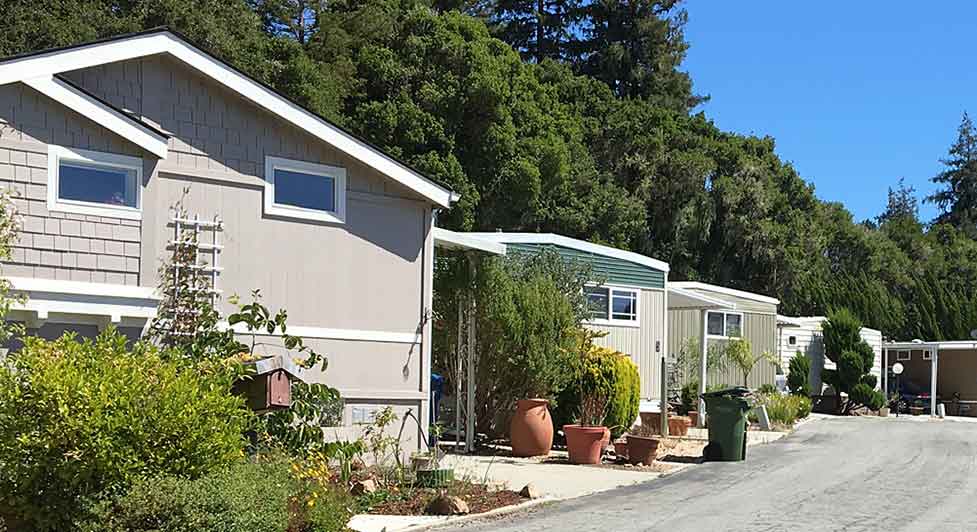Lument’s Commitment to Resident-Owned Communities Pays Off For Aptos Knoll
MANUFACTURED HOUSING | Aptos, CA

The members of the board of directors at Aptos Knoll, a resident-owned manufactured housing community near Santa Cruz, California, had two objectives for refinancing their loan: they wanted to increase the size of their loan and lower its interest rate, enabling the community to tackle a costly maintenance project with minimal impact on resident fees. Working with Lument, the community met both those objectives — and locked in a great rate for 30 years.
The Background: Nontraditional MHC Ownership is on the Rise
Only a small portion of manufactured housing communities (MHCs) are owned by their residents, but this option is growing in popularity — and for good reason. Members of resident-owned communities (ROCs) control their destinies. When residents cooperatively hold the land beneath their park, they can set their community’s fees and establish its rules. They are not subject to the decisions of a third-party owner, who might raise rents, sell to another company, or neglect maintenance and upkeep. Today, there are more than 1,000 resident-owned MHCs across the United States, with concentrations in the Northeast, California, Florida, and the Pacific Northwest.
Generally, fees at ROCs are typically lower than rents at comparable privately-owned communities. A study commissioned by the nonprofit ROC USA® found that most ROCs operate at or below market rates. This level of affordability has inspired Fannie Mae and Freddie Mac to increase liquidity for nontraditional owners under their Duty to Serve mandate.
But with ownership comes responsibility — and that requires ROC boards of directors to master the essentials of the MHC business — or hire managers to act on their behalf. Regardless, one of the most difficult tasks communities face is arranging for financing. For some banks, nontraditional ownership is a red flag.
The Challenge: Finding a Lender to Refinance their Loan
The residents of Aptos Knoll Mobilehome Park, a resident-owned, nonprofit seniors community in Aptos, California, have found a comfortable niche. The community is a mile from Monterey Bay, just 20 minutes east of Santa Cruz. Being part of a ROC contributes to their peace of mind. In one of the most expensive areas in the nation, their monthly fees are modest. And as Ken Braly, the treasurer of the community’s board of directors points out, “With all our members over 55, we particularly value the stability and control that comes with being resident owned.”
In 2020, the 15-year adjustable-rate loan held by the Aptos Knoll Mobilehome Owners Association, which is structured as a mutual benefit corporation, was about to reset — and the board of directors were considering refinancing. Board members were concerned that rates were about to rise — and they wanted to boost the community’s capital reserves, knowing that a series of retaining walls would require replacing in the near future.
Their challenge was finding a lender who would offer them a larger loan at a lower interest rate, thus minimizing the impact of the additional financing on monthly resident fees.
The Solution: A Once-in-a-Lifetime Loan
Lument delivered on its commitment, going from executed loan application to loan funding in less than 45 days and providing MW Group with its financing on July 28: a $33.2 million, 10-year, fixed-rate loan at 3 percent interest and five years of interest-only payments. The client was pleased, sending the Lument team a note praising its “exceptional” execution and asking Harper to express his gratitude to all involved. Harper credits the extra level of vigilance and time the entire team and client put into the deal for its success. “During the pandemic, you have to put more work upfront just to screen the deal, and even after you are underwriting, there is more focus on the property’s latest monthly collections and occupancy than in normal times,” he said. For his part, Kitts stresses that his team was able to meet MW Group’s needs even as Lument was in the first months of its integration. “We were in the midst of adopting best-of-class procedures from all three of our brands — Hunt Real Estate Capital, Lancaster Pollard, and RED,” he said. “We were successful because we were able to effectively manage changes in our internal processes even as we were responding to an extremely fluid and uncertain external environment.”
The Impact: From Application to Closing in 22 Days
Ken Braly, like most ROC directors, is not an expert in MHC management. He is a software specialist and public speaker who has worked with start-ups as well as corporations that are household names. And again, like most ROC directors, Braly has had to learn on the job. “Working with Fannie Mae was not something we ever contemplated,” he says. “The Lument team stepped up to make the transaction as smooth as possible.”
One point that he is especially appreciative of is the waiver the community received for not having audited books. Braly felt it illustrated Lument’s receptiveness to ROCs as well as its established relationships with Fannie Mae. From Breheny’s point of view, requesting the waiver was an easy call. “The community has a great payment history, and its finances are in excellent shape, but it did its own bookkeeping,” Breheny notes. “We secured a waiver in return for their commitment to have its books audited going forward.”
The loan closed at the end of 2020. “This was a milestone for our community,” Braly says. “Not only do we have funds to address our immediate needs, but we have gone a long way to secure the financial stability of the community for the next three decades. Lument helped make that possible.”
